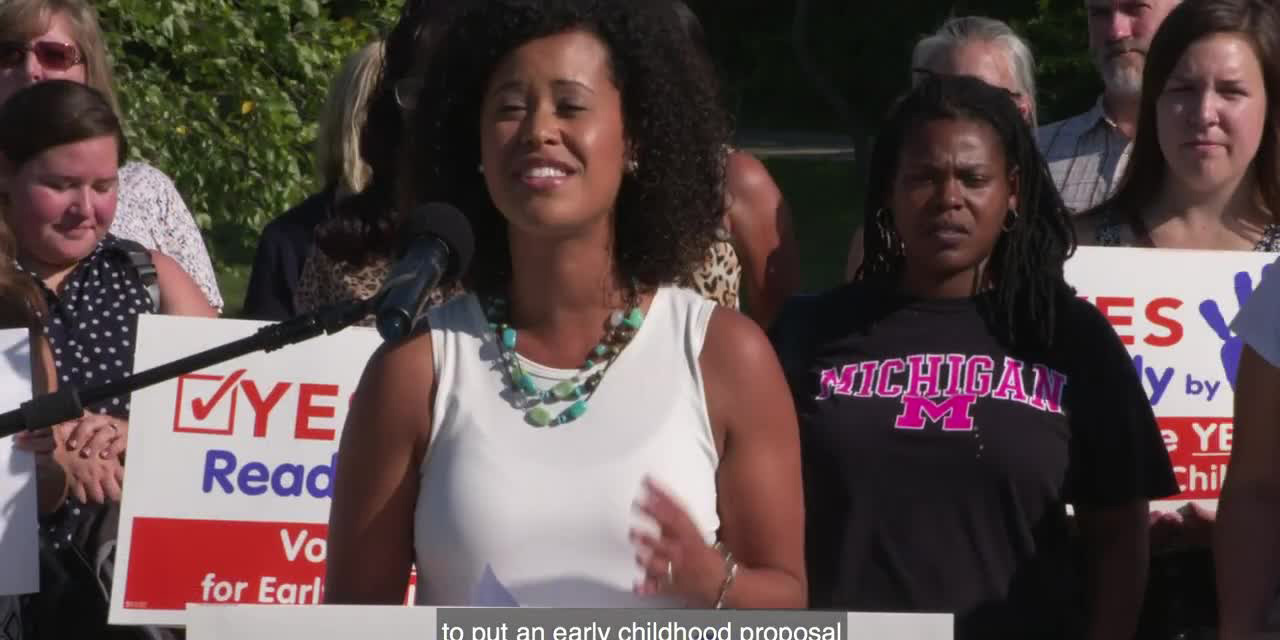In three of the last four presidential elections, most voters in Kent County, Michigan, cast their ballots for the Republican nominee — including for Donald Trump, in 2016.
But last November, voters in and around Grand Rapids, Michigan’s second-largest city (population 200,000), made Kent County the first county in Michigan to approve a referendum that raises property taxes specifically for early childhood.

It’s the first such ballot measure in the nation to raise money only for early childhood, even as other communities around the nation have included early childhood in referendums that benefit older children as well, says Annemarie Valdez, president and chief executive officer of First Steps Kent. First Steps Kent led the referendum drive.
Strategy was important in the campaign, Valdez says.
“There were two big messages and we stuck to keeping it very simple,” she recalls. “One was that we were supporting parents, not replacing them, because a lot of voters want to say, ‘That’s a parent’s job’ or, ‘parents should be doing it.’ We were just trying to get parents resources and support.
“And a tremendous help with the business community,” Valdez adds, “was all the brain research and the return on investment for business messaging. You’re going to invest early, but children are going to be successful in school and you’re going to get a viable workforce by doing that.”
Hiring a firm with political expertise was critical, as well, according to Valdez
“If you’re able to do that, I would highly recommend it because we’re just regular folks, politics isn’t our thing, and most people who are working in nonprofits are not going to know politics like a political firm would,” she says. “So, even though it’s a big commitment and it can be expensive, a firm is really going to give you that ability to narrow down your messages to get into the minds of voters and to understand your community better.”
First Steps Kent manages the funds. But members of the nonprofit, along with elected members of the Kent County Commission and community members decide which agencies will receive funds. Officials have begun allocating what is expected to be $34 million over six years.
They are to be spent for the health, well-being and school readiness of children under age 5 — services such as home visiting, play and learn groups, and developmental screening.
The Ready by Five Early Childhood millage, as it is known, will cost a homeowner with a $150,000 house about $18.75 per year.
The first round of funding, done last month, is for $2.4 million over two years to four organizations for navigation and outreach efforts. The money is to be used to connect families to programs that improve the health and school readiness of young children. The recipients include three nonprofits and a regional school agency that serves school districts.
First Steps Kent is now accepting applications for the second round of funding, some $5 million, which will be allocated to agencies that do home visits, teach age-appropriate activities to child care providers, test for things such as lead in homes, and provide parental coaching.
“We’re going into territory that hasn’t been touched before, because it’s innovative systems thinking, and that’s very tough to do unless you have buy-in from the community that you live in,” Valdez says. “It does feel like we’re pioneers.”
The following lessons have been created from a March 2019 report by the Center for the Study of Social Policy, which works to “create a fair and just society in which all children and families thrive”; and the National Collaborative for Infants and Toddlers, which supports policies and programs for children up to age 3.
- Learn from Other Communities with Dedicated Funding Experience. Do not reinvent the wheel. Take the time to reach out, create connections with, listen to and learn from other communities that have done this work before.
- Trust Your Firm. If your community has the resources to hire an outside political marketing firm, trust their work. Help them understand your community and your goals, but allow their expertise to help shape your strategies.
- Keep It Simple. Know which specific issues you hope to tackle or which funding stream(s) you hope to access. Don’t try to do everything at once.
- Create a Recipe for Community Success. Use your knowledge of your community’s unique qualities when crafting your plans. If there are specific political or historical realities, take those into consideration.
- Build a Strong Coalition of Funders and Supporters. Unite multiple industries and stakeholders. Think of the ways in which businesses, parents, the public sector and others are impacted by early childhood issues. Use this information to help build a group of diverse people and organizations to engage in your work.
- Build a Realistic Campaign Budget and Stick to It. Fundraising is often necessary to get an initiative on the ballot and absolutely necessary to get an initiative passed. Campaigns require the investment of committed, enthusiastic stakeholders who are willing to dedicate themselves to spreading the word about the initiative. Campaigns are costly and take time to build momentum. Be sure to make room in the budget for advertisements in all the different media, which are most effective in your community.
- Keep Your Common Goal in Mind. Try having a motto for your campaign or guiding principles which serve to remind all participants in your work of their shared purpose.
- Keep It Non-partisan. Focus on the selling points of your work, which are palatable on both sides of the aisle. Most people agree that children should have a healthy start in life. Start there.
- Engage Grassroots and Grasstops. Work with everyone who is sympathetic to your cause. If there are board members, national experts or top business people who care about what you’re doing, get them involved. If there are interested parents, teachers or others who work at the community level, invite them to be part of the effort as well. Your strategy should span multiple levels of influence.
- Stay the Course. When concerns about possible millage fatigue arose, First Steps Kent weighed the pros and cons and ultimately moved forward with the early childhood millage. You won’t know whether you’ll be successful until you try.
More
Webinar: How funding for early childhood was won in Kent County, Mich., and Palm Beach, Fla.
Video: Why businesses should invest in Early Education with Dr. Sara Watson.
Video: Helping business leaders back Early Learning initiatives with JD Chesloff
Video: The economics benefits of Early Learning with Scott McCain
Tom Kertscher
Milwaukee journalist Tom Kertscher was a 35-year newspaper reporter, finishing that career at the Milwaukee Journal Sentinel. Now a freelance writer, his work includes fact-checking for PolitiFact and sports reporting for the Associated Press. His reporting on Steven Avery was featured in Making a Murderer. Kertscher is the author of sports books on Brett Favre and Al McGuire. Follow him at TomKertscher.com and on Twitter: @KertscherNews and @KertscherSports.



